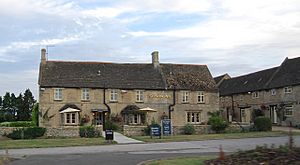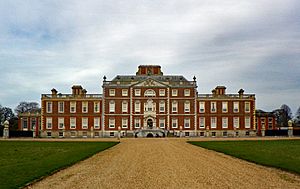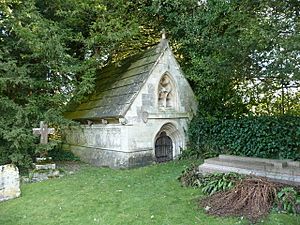Edmund Boulter facts for kids
Edmund Boulter (born around 1635, died 1709) was a successful merchant and politician in London. He was the oldest son of John Boulter, who made and sold malt, and was mayor of Abingdon twice. His mother, Susannah Cutler, was the sister of Sir John Cutler, 1st Baronet, who later became Edmund's business partner.
Contents
Edmund Boulter's Early Life and Family
Growing up during a time called the Interregnum (when England was without a king), Edmund Boulter chose to be a Dissenter. This meant he was a Protestant who did not agree with the official Church of England.
When he was about twelve, on July 23, 1647, he began training with the Haberdashers' Company. This was a powerful group for merchants who sold clothing and other goods. His father passed away when Edmund was young. Edmund helped his younger brothers and sisters get an education. He also helped their children later on.
His brother, Robert Boulter, was a stationer (someone who sold paper and books) in Cornhill, London. Robert was a big supplier of books to places like Massachusetts in America. He was also one of the first people to publish John Milton's famous poem, Paradise Lost.
Edmund Boulter's Business Career
Edmund Boulter became a very successful businessman. Even though he was part of the Haberdashers' Company, the Worshipful Company of Grocers wanted him to join them. This shows how much business he did with the Grocers.
Serving the City of London
Edmund Boulter was chosen for the City of London Lieutenancy several times. This was an important group that helped govern London. He was selected in 1690, 1694, 1704, and 1708.
In July 1694, he was also chosen to be a Sheriff of London. This was a big responsibility. However, he paid a fine to avoid having to take on the role.
Inheriting Estates and Travel
Edmund's uncle and business partner, Sir John Cutler, passed away in 1693. Less than four years later, Sir John's daughter, Elizabeth, Countess of Radnor, also died. She did not have any children. Because of this, the properties in her marriage agreement went back to Edmund Boulter.
Now, Edmund had two more large estates to manage. These were Wimpole Hall in Cambridgeshire and Gawthorpe Hall near Leeds in Yorkshire. He had to travel often between Leeds and Cambridge on the Great North Road. By this time, he was nearly 70 years old.
To make his journeys easier, he set up special mounting posts along the road. These posts had three steps. They helped him get onto his horse more easily, as he was a large man. A report from a century later mentioned these stones. It said, "From Stilton to Grantham at convenient distances, are stones with three steps, placed there by a Mr Boulter... on each stone was engraved E.B. 1708."
Edmund Boulter in Parliament
In 1698, Edmund Boulter was elected as a Member of Parliament (MP). He represented the area of Boston, Lincolnshire. He had done business there for a long time.
Being an MP gave him special legal protections, called parliamentary privilege. This might have helped him with a legal issue involving his cousin's husband, the Earl of Radnor. Edmund Boulter did not run for Parliament again after this term.
Edmund Boulter's Death and Legacy
Edmund Boulter passed away on February 15, 1709. He was buried nine days later in a church called St Christopher le Stocks in London.
He was a very wealthy man. It was said he was worth £150,000. He left a lot of money and property to his relatives. Besides the estates he inherited (Wimpole, Gawthorpe, and Harewood), he owned many other properties. These included estates in Oxfordshire, Lincolnshire, Kent, Somerset, and Hampshire. He also owned the manor of Deptford near London.
Boulter Exhibition at Pembroke College, Oxford
Edmund Boulter had a nephew also named Edmund Boulter (1678-1736). This nephew later left money to Pembroke College at Oxford University. In 1736, he set up a scholarship worth £20 a year. It was named the Cutler-Boulter Scholarship. This was to honor his great-uncle, Sir John Cutler.
This scholarship has helped many students over the years. Some famous people who received this scholarship include Oswald Lewis, Thomas Smith, and Richard Sorabji.
Cutler Boulter Almshouses
The younger Edmund Boulter also left money to create the Cutler Boulter Almshouses. These were located in St Clement's, just outside Oxford. Almshouses were places that provided homes for poor people.
The site also included a home for an apothecary (like a pharmacist). This apothecary gave free medical advice and care to poor people living in Oxford. The almshouses were taken down in the 1880s. However, the money from selling the land was used to start the Cutler Boulter Provident Dispensary. This dispensary provided medical care from 1884 to 1950.
Images for kids
 | Isaac Myers |
 | D. Hamilton Jackson |
 | A. Philip Randolph |







